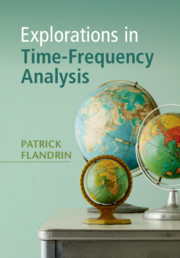Book contents
- Frontmatter
- Dedication
- Contents
- Acknowledgements
- Preface
- Notation
- 1 Introduction
- Part I Basics and Constraints
- 2 Small Data Are Beautiful
- 3 Of Signals and Noise
- 4 On Time, Frequency, and Gauss
- 5 Uncertainty
- 6 From Time and Frequency to Time-Frequency
- 7 Uncertainty Revisited
- 8 On Stationarity
- Part II Geometry and Statistics
- References
- Index
2 - Small Data Are Beautiful
from Part I - Basics and Constraints
Published online by Cambridge University Press: 22 August 2018
- Frontmatter
- Dedication
- Contents
- Acknowledgements
- Preface
- Notation
- 1 Introduction
- Part I Basics and Constraints
- 2 Small Data Are Beautiful
- 3 Of Signals and Noise
- 4 On Time, Frequency, and Gauss
- 5 Uncertainty
- 6 From Time and Frequency to Time-Frequency
- 7 Uncertainty Revisited
- 8 On Stationarity
- Part II Geometry and Statistics
- References
- Index
Summary
Besides current new trends related to “big data”, there is still room for a detailed analysis of the fine structure of small size signals. Typical examples are briefly presented, ranging from bioacoustics to mathematics, via physics. Illustrations motivate the usefulness of the methods to be introduced – that are to be described in the rest of the book, the idea being to come back to the analysis of those signals in the last chapter. All of those signals are chirps, with instantaneous characteristics (amplitude and frequency) and are captured by the notion of analytic signal. The ubiquity of chirps is supported by the listing of many additional examples in science and engineering.
Keywords
Information
- Type
- Chapter
- Information
- Explorations in Time-Frequency Analysis , pp. 9 - 20Publisher: Cambridge University PressPrint publication year: 2018
